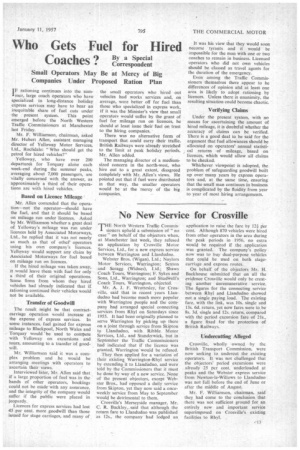Who Gets Fuel for Hired
Page 51

If you've noticed an error in this article please click here to report it so we can fix it.
Coaches ? t a resitedt1
Small Operators May Be at Mercy of Big Companies Under Proposed Ration Plan
IF rationing continues into the sum' mer, large coach operators who have specialized in long-distance holiday express services may have to bear an inequitable share of fuel cuts under the present system_ This point emerged before the North Western Traffic Commissioners at Manchester last Friday.
Mr. F. Williamson, chairman, asked Mr, Hubert Allen, assistant managing director of Yelloway Motor Services, Ltd., Rochdale: "Who should get the petrol for hired vehicles?"
Yelloway, who have over 200 departures for Torquay alone each week-end during the summer peaks, averaging about 7,000 passengers, are vitally concerned with the answer, as approximately a third of their operations are with hired vehicles.
Based on Licence Mileage
Mr. Allen contended that the operation—not the operator—should have the fuel, and that it should be based on mileage run under licences. Asked by Mr. Williamson whether a great deal of Yelloway's mileage was run under licences held by Associated Motorways, Ltd., he replied that it was not nearly as much as that of othef operators using his own company's licences. Yelloway would support any claim by Associated Motorways for fuel based on mileage run on licences.
If the hired mileage was taken away, it would leave them with fuel for only a third of their original operations. Some firms from whom they hired vehicles had already indicated that if rationing continued their vehicles would not be available.
Transfer of Goodwill
The result might be that contractcarriage operation would increase at the expense of express services. In some instances, fuel gained for express mileage to Blackpool, North Wales and Torquay would be used to compete with Yelloway on excursions and tours, amounting to a transfer of goodwill.
Mr. Williamson said it was a complex problem and he would be arranging meetings with operators to ascertain their views.
Interviewed later, Mr. Allen said that if a large proportion of fuel was in the hands of other operators, bookings could not be made with any assurance, and the integrity of the company would suffer if the public were placed in jeopardy.
Licences for express services had lost 45 per cent. more goodwill than those issued for stage carriages, and many of the small operators who hired out vehicles had works services and, on average, were better off for fuel than those who specialized in express work. If it was the Minister's view that small operators would suffer by the grant of fuel for mileage run on licences, he should at least issue their fuel on trust to the hiring companies.
There was no alternative form of transport that could carry their traffic. British Railways were already stretched to the limit at peak holiday periods, Mr. Allen added.
The managing director of a mediumsized concern in the north-west, who hire out to a great extent, disagreed completely with Mr. Allen's views. He pointed out that if fuel were distributed in that way, the smaller operators would be at the mercy of the big companies. It was his view that they would soon necome tyrants and it would be impossible for the man with one or two coaches to remain in business. Licensed operators who did not own vehicles should be classed as travel agents for the duration of the emergency.
Even among the Traffic Commissioners themselves there appear to be differences of opinion and at least one area is likely to adopt rationing by licences. Unless there is unanimity, the resulting situation could become chaotic. '
Verifying Claims
Under the present system, with no means for ascertaining the amount of hired mileage, it is doubtful whether the accuracy of claims can be verified. There is a good deal to be said for the argument that fuel allowances should be allocated on operators' annual statistical returns of mileage, based on licences, which would allow all claims to be checked.
Whichever viewpoint is adopted, the problem of safeguarding goodwill built up over many years by express operators and, at the same time, ensuring that the small man continues in business is complicated by the fluidity from year to year of most hiring arrangements.












































































































